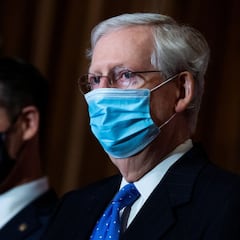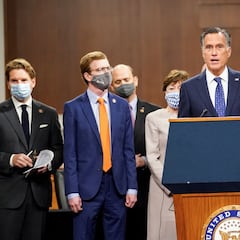Bipartisan stimulus bill: what’s in the $900 billion proposal?
A brand new proposal brings fresh hopes to break a months-long stalemate, which still stalls the negotiations on coronavirus economic relief.

The clock is ticking for Congress to get much needed stimulus money signed off before year’s end as they’re scheduled to go home for the holidays as soon as next week.
Congress has an 11 December deadline to fund the government and avoid a shutdown. This has brought hope that the lame-duck session could see some coronavirus stimulus spending tied in with the bill. All parties say they're eager to take some action but the devil is in the details.
Stalemate between Democrats and Republicans on new stimulus
The negotiators Nancy Pelosi for Democrats and Steven Mnuchin and Mitch McConnell on the Republican side have been at loggerheads on specifics of a significant second bill since June. Major tensions remain between the parties on the overall spending and scope of the bill.
While Pelosi has dropped the $3.4tn overall spend proposed in the Democrats’ failed HEROES Act to $2.2tn, Mnuchin has raised the White House’s offer from the $1tn in the HEALS Act - a bill proposed by GOP senators in July - to $1.9tn.
New bipartisan bill: can it break the deadlock?
A new plan intended to break the stalemate was presented by a bipartisan group of moderate House and Senate members on Tuesday at a press conference. The bill amounts to a middle-ground option between McConnell’s current proposal and the Democrat House bill passed in October. The plan calls for $908 billion on a range of covid-19 relief measures.
During the presentation Mitt Romney, Republican of Utah said “I happen to be a deficit hawk. I don’t like borrowing money. I don’t like spending money we don’t have. But the time to borrow money is when there is a crisis. And this is a crisis.”
Part of the bill provides for four months of additional unemployment benefits but in a compromise the top-up would be just $300 as opposed to the $600 Democrat were seeking. The bill also calls for state and local funding to the tune of $160 billion, which will pay for front line workers. However, like the McConnell proposal there is no provision in the bipartisan proposal for another $1200 stimulus check.
Senate Republican leaders quickly undercut the plan, offering up their own bare-bones proposal that stood little chance of passing through both chambers.
What’s in Mitch McConnell’s counter-plan?
McConnell now circulating a plan with:
— Jeff Stein (@JStein_WaPo) December 1, 2020
- no state & local aid;
- only 1 additional month in PUA & PEUC for jobless Americans;
- no additional stimulus checks;
- Sen. Cornyny's proposed liability shield;
- no money for transit agencies
...among other non-starters for Dems https://t.co/DD5Rd0Dd1t
Republican Senate Majority Leader Mitch McConnell has long been the death knell for Democrat bills for stimulus spending to counter the effects of the pandemic-induced recession. Prior to the election, House Democrats were negotiating with the White House to enact a $2 trillion-plus package but the negotiations floundered. Not that the package stood much of a chance in the Republican-led Senate where even a more modest $1 trillion bill failed the necessary votes.
Now McConnell has presented a new plan to his GOP colleagues, one that he drafted in conjunction with the White House. The proposal does not include a new round of stimulus checks. However, it does include one additional month of unemployment benefits to under the Pandemic Unemployment Assistance (PUA) and Pandemic Emergency Unemployment Compensation (PEUC). It will also provide $300 billion for small businesses and $31 billion for the distribution of a vaccine. McConnell’s framework would primarily repurpose unused money already approved as part of the $2.2 trillion stimulus bill enacted in March.
McConnell's counter-proposal would not include any aid for state and local governments, making it a nonstarter for Democrats, who have long pressed to send hundreds of billions of dollars across the country to help cities and states weather fiscal crises.
Related stories
“We don’t have time for messaging games, we don’t have time for lengthy negotiations. The issue is, we want to get a result,” McConnell said at his weekly news conference on Tuesday, “I like to remind everybody that the way you get results is, you have to have a president’s signature.”
“Additional covid relief is long overdue and must be passed in this lame-duck session,” Nancy Pelosi said in a statement after the call.
Families struggling for months already to keep a roof over their head and to put food on the table can't afford to wait. They need urgent help right now.
— Nancy Pelosi (@TeamPelosi) December 2, 2020


